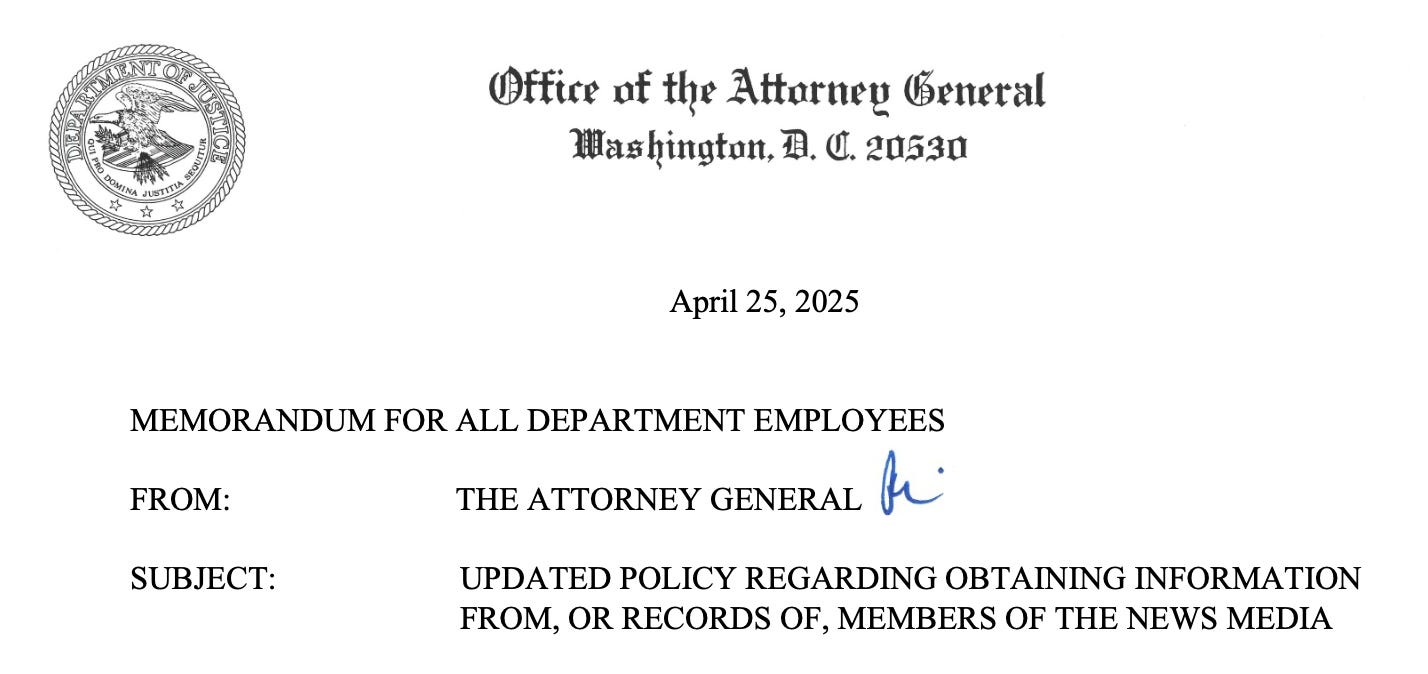A.G. Bondi reverses Garland policy against subpoenaing journalists
Stating that leaks "undermine President Trump’s policies," Attorney General Pam Bondi announced that "the news media ‘must answer subpoenas’ when authorized."
Attorney General Pam Bondi on Friday announced a stepped-up effort to go after government leaks by changing the policy for when the Justice Department will seek information from journalists — reversing a Biden administration policy barring “compulsory process.”
Echoing President Donald Trump’s criticism of the Justice Department during the Biden administration, Bondi wrote in an “UPDATED POLICY REGARDING OBTAINING INFORMATION FROM, OR RECORDS OF, MEMBERS OF THE NEWS MEDIA” memorandum for all Justice Department employees, “The Biden Administration … abused [Attorney General Merrick] Garland’s overly broad procedural protections for media allies by engaging in selective leaks in support of failed lawfare campaigns.”
“[U]nder the revised regulations implemented today, the news media ‘must answer subpoenas’ when authorized at the appropriate level within the Department of Justice,” Bondi wrote, ending Garland’s policy. Under Garland’s policy, he had stated that DOJ would “no longer use compulsory legal process for the purpose of obtaining information from or records of members of the news media acting within the scope of newsgathering activities ….”
For Bondi, though, “unauthorized disclosures … undermine President Trump’s policies, victimize government agencies, and cause harm to the American people.“ Bondi’s four-page memo, obtained by Law Dork, cited articles from The Washington Post and The New York Times that have been published in recent months as evidence of “leaks of classified information.”
Quoting from Trump’s memorandum targeting Miles Taylor, the former Trump administration employee who wrote an op-ed criticizing Trump during his first term, Bondi stated that where a federal employee “improperly discloses sensitive information” for “personal enrichment” and to “undermin[e] our foreign policy,” the act “could properly be characterized as treasonous.“
As such, she wrote, “Accountability, including criminal prosecutions, is necessary to set a new course.”
Per Bondi, the new policy includes the following at its core:
Accordingly, under the revised regulations implemented today, the news media "must answer subpoenas" when authorized at the appropriate level within the Department of Justice.[9] Specifically, the policy contemplates the use of subpoenas, court orders, and search warrants to compel production of information and testimony by and relating to members of the news media, subject to the Privacy Protection Act, 42 U.S.C. § 2000aa, and the approval of the Department's leadership in some instances. Members of the news media are presumptively entitled to advance notice of such investigative activities, subpoenas are to be narrowly drawn, and warrants must include protocols designed to limit the scope of intrusion into potentially protected materials or newsgathering activities. When considering whether to approve the use of such techniques, the Attorney General will consider, among other things,
Whether there are reasonable grounds to believe that a crime has occurred and the information sought is essential to a successful prosecution;
Whether prosecutors have made all reasonable attempts to obtain the information from alternative sources; and
Whether, absent a threat to national security, the integrity of the investigation, or bodily harm, the government has pursued negotiations with the affected member of the news media.
The Attorney General must also approve efforts to question or arrest members of thew news media.
The memo also details forthcoming changes to the associated regulations (as of 2022) and Justice Manual.
Reporters Committee for Freedom of the Press President Bruce D. Brown issued the following statement, provided to Law Dork responding to the news:
“We have seen this announcement, but we haven’t seen the language of the new policy.
“Some of the most consequential reporting in U.S. history — from Watergate to warrantless wiretapping after 9/11 — was and continues to be made possible because reporters have been able to protect the identities of confidential sources and uncover and report stories that matter to people across the political spectrum.
“Strong protections for journalists serve the American public by safeguarding the free flow of information.
“We’ll wait to see what the policy looks like, but we know reporters will still do their jobs, and there is no shortage of legal support to back them up.”
The new policy announcement comes just short of 100 days into Trump’s second term and on the same day that F.B.I. Director Kash Patel announced, with Bondi’s support, the arrest of a state court judge in Milwaukee on a criminal complaint alleging that the judge obstructed or impeded federal efforts to arrest a person for immigration removal proceedings on the basis of an administrative warrant.
This is a developing story. Check back at Law Dork for the latest.





The only people leaking "classified information" are the incompetent, inept amateurs trump appointed to his cabinet.
Remember Jamaal Kashoggi.